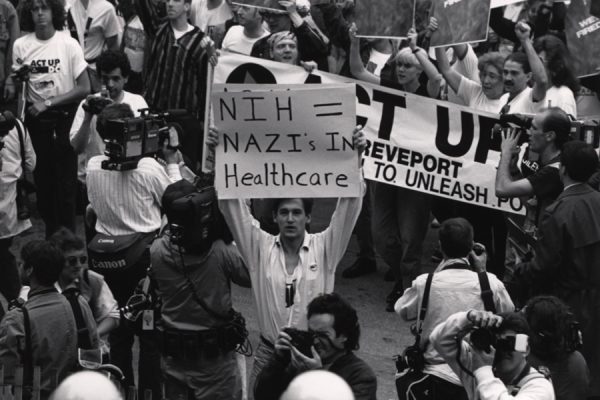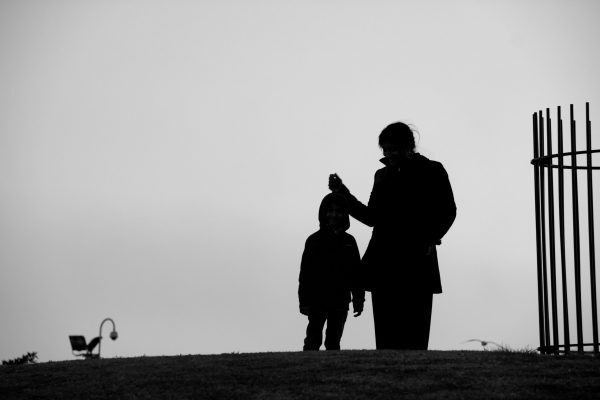It has been thirty years since Lisa Duggan issued a challenge to fellow scholars in the emerging discipline of queer theory. “The time has come,” she wrote, “to think about queering the state.” A “record for antigay initiatives in the United States” was set in 1994, she observed—“part of a grander scheme to organize a right-wing voting block to take on issues such as abortion rights, school curriculums, and tax policies.” In the face of this onslaught, it was imperative “to turn our attention to state politics.”
Three decades later, the situation sadly looks much the same, or worse, in the United States: abortion rights have been rolled back, public schools have been racked by anti-trans panic, and a raft of anti-LGBT laws have been passed across the country. In his new book, A Queer Theory of the State, historian Samuel Clowes Huneke echoes Duggan’s call and finds engagement with the state equally urgent today. But what should that engagement look like, given the long and inspiring tradition of queer radicalism that has been animated—for good reason—by a “profound distrust of the state”?
In what follows, fellow historian Hugh Ryan talks with Huneke about his book, the history of queer theory and activism in relation to the state, and paths forward for queer politics. Their conversation is adapted from an event that took place at P&T Knitwear bookstore in January. It has been updated and edited for clarity and concision.
Hugh Ryan: You situate the genesis of the book during the U.S. Mpox outbreak in 2022, writing that that “summer became a kind of Rorschach test for LGBTQ activists and intellectuals steeped in queer theory.” What did people see in that Rorschach test, and how did it bring you to write this brief for a queer theory of the state?
Samuel Huneke: I was thinking about these issues at the same time that the virus was sweeping through the queer community in 2022. There was a lot of fear then. Mpox is an incredibly painful disease, and it seemed that it was primarily spreading through sexual contact between gay men that summer. The Biden administration was slow to respond to it. People weren’t getting the care they needed from hospitals, and they weren’t being told who was most at risk. Eventually, the administration got its act together, vaccines were distributed, and cases began to decline dramatically.
This brings me to the Rorschach test. Two quite distinct camps emerged in the wake of the outbreak. One was saying, especially toward the end of the crisis, “look, this successful intervention in public health is a great example of why we need the state.” The other was focusing much more on what the Biden administration did wrong, asserting that it had been not only incompetent but also malicious—a sort of redux of the Reagan administration’s malevolent neglect of the AIDS crisis.
This debate is how I frame the book. As queer people, do we see the state as something basically pragmatic and useful—even if it could do its job much better than it’s doing now—or do we see it as essentially, irredeemably malicious?
HR: That reminds me of Eve Kosofsky Sedgwick’s distinction between “reparative” and “paranoid” reading. You might put it this way: Are we doing a paranoid reading of the state, or are we doing a reparative reading of the state? In any case, you don’t just sketch this debate; you take sides in it. As you write, “I continue to believe it is important for queer progressives to explain and defend a vision of the state.” Why is it important, and what is your vision of this state that queer progressives can rally behind?
SH: There are good reasons for queer theory’s skepticism of the state. Many queer activists and theorists look back historically and say, well, the state has been a source of violence against queer people, so there’s nothing for us here. To take just one example, queer theorist Eric Stanley has recently argued that the state is fundamentally unable to “offer us relief.” On this kind of account, there’s no reason we should trust the state or be willing to work with it. Intellectually, Michel Foucault has also had a huge influence on the orientation of queer theory. His work looked at sites of everyday power, especially within institutions like prisons, schools, and clinics; he was very uninterested in the state as such. I think those are two reasons queer theory shies away, in large part, from thinking about the state, even if that is starting to change.
But I think that history tells a more complex story about the state. We have to concede that the state, though a locus of violence against many populations, has also been a force that has made modern life possible and thinkable and more comfortable and more pleasurable and more enjoyable. There are certainly harmful facets of the state: the police, the carceral system, surveillance apparatuses, and so forth. Ironically, these parts of the state have been most resistant to the logic of neoliberalism, sucking up more and more public resources even as the welfare state is slashed and burned. But these are ever-changing and historically determined forms of statehood, not metaphysical essences of “the state.”
So, what do I mean by the state, if not the violent, neoliberal state of today? Well, I am most interested in the basic infrastructure that states provide: public health, public education, public transportation—all these benefits that we derive from the state. These are public goods that neoliberalism has decimated, especially in the United States. But European social democracies do provide them. And I think it’s really hard—for me, at least, it’s quite hard—to imagine a utopian future where there isn’t some sort of locus of communal decision-making that can delegate resources in a way that will benefit those most in need, will benefit the community. We might as well call that locus “the state.”
In place of the anarcho-libertarianism that pervades much of queer theory, the vision I advance is what I call queer democracy. This might sound obvious, but, in fact, there is a great hostility toward democracy in much of queer theory’s antipathy to the state. Democracy, queer critics point out, hasn’t always protected—indeed, has often oppressed, is still oppressing—queer people. Democratic majorities can, and do, vote to oppress minorities. But, much of this incompatibility stems from the way that democracy has been imagined historically in a liberal and therefore limited fashion. The history of democracy, that is to say, is only history: just because things have been this way doesn’t mean they have to stay this way. That’s the basis of any sort of activism, after all!
What would a queerer democracy look like? Fundamentally, I argue that we have to reject the liberal theory of individualism that underpins contemporary democracy: making the individual, and individual rights, the basic unit of society. Instead, I draw on theorists from Judith Butler to Bonnie Honig to argue that, in certain important ways, society—the community—precedes the individual. What that means politically, to my mind, is that we all owe each other things. A queer democracy would take that communitarian sense of relationship as its basis, as a way of thinking about political structures that best express our obligations to each other. This is not a brand new invention, of course—plenty of other thinkers have imagined communitarian forms of democracy—but rather a way of thinking democracy through queer theory.
HR: I love this point you make in the book. On the one hand, if we all were to act just as individuals, the state would no longer exist. On the other hand, it’s the state that guarantees that freedom to act as individuals.
SH: Exactly. This is one of the big problems with classical liberalism. There’s this tension between seeing the state as the guarantor of freedom and seeing it as the greatest threat to freedom. Moreover, neoliberalism has made it hard for us to see the state as an extension of individuals. And that’s a problem for queer theory as well: it’s very difficult for queer theorists to see that the state is, or at least ought to be, an extension of us.
HR: As you said, it’s historically rooted. We’re often dealing with a state that is so entrenched in so many damaging ways that it’s hard to imagine interacting with it in a way that is not punitive or oppressive.
I think that’s why, when I talked about your book with a number of people, many offered critiques, mostly from the left. They all converged in concluding that queer liberation is incompatible with the existence of the nation-state. Drawing on these conversations, I want to pose three objections and ask how you’d respond.
The first begins with the observation that queer interactions with the state have mostly been in the name of individual rights: rights to marry and assimilate, rights to be in the military. This is a very neoliberal orientation. And by meeting the needs of the already privileged in the community, this kind of engagement with the state tends to split the queer community rather than queering the state itself. In your book, you mention Sarah Schulman’s recent history of ACT UP, Let the Record Show, which offers a really great example of this. She talks about this moment in the early 1990s when the Treatment & Data Group of ACT UP—primarily composed of gay white men—split from the rest of ACT UP to pursue an insider strategy, working more closely with the government to get drugs approved. In the end, the Treatment & Data folks achieved their goals, but their leaving weakened ACT UP as a whole, and paradoxically, might have set back other, larger goals—like health care for all.
In your view, how is it possible to engage with the state in a way that doesn’t result in the fracturing of the queer community—peeling off those the state can give the least to, and thus neutralizing the movement?
SH: That’s a great question. I think there are a couple ways of thinking about it, one in a more productive way and another in a more critical way.
The first is that we can queer the state—can think about the state in a productive way—without assuming we’re ever going to get to an absolutely perfect state. I’m very much of the view that we shouldn’t let the perfect be the enemy of the good. In this sense, ACT UP’s insider-outsider strategy is an enormously effective model for how to engage with the state. And its effects weren’t by any means all bad. It did primarily benefit people who already had a fair degree of privilege in our society. But it also led to real change and greater access for really essential new drugs, major achievements to continue building on.
I think the point is even clearer when we look at gay marriage. Many of the most vocal early advocates were gay conservatives like Andrew Sullivan, who were quite explicit that their goal was to deradicalize queerness—to enclose or domesticate it. That’s precisely why they thought gay marriage was good politics. For this book I went back and read around in those marriage equality debates. A lot of the people on the more radical side, who opposed making gay marriage the flagship queer policy or activist initiative in that period, argued that it was not just bad policy, but also stupid politics. That is, they argued it just wasn’t going to be effective in terms of winning votes or changing laws. Instead, they wanted to preserve the more radical nature of early gay liberation—deconstructing marriage and the family, expanding access to health care, building coalitions with other progressive movements. Yet, marriage equality turned out to be one of the most wildly successful social movements of the twenty-first century.
So, who was right? We’ve been living with marriage equality for quite some time now, and I actually think both extremes have been proven wrong. I don’t think gay marriage has totally domesticated queerness in the way the Sullivans of the world hoped it would. But I also don’t think radicals have succeeded in disrupting traditional marriage or proposing a genuinely liberating alternative that the masses are flocking to. To the extent that they married and took advantage of these new rights, many wealthy, white gay men did “split off” from more radical queer demands, yes. But, at the end of the day, gay marriage did materially improve the lives of a lot of people—not just wealthy, white, cis gay men. And, more importantly, it has helped change how many people in the United States think about queerness overall. It would be hard to overstate just how important and profound these shifts have been, in such a short period of time.
HR: Gay people, yes—especially cis gay men—but I’m not sure the benefits have really extended to queers, because we’re in a moment of really expanded policing (literal and symbolic) of gender identity, and gay people are on all sides of this “debate.”
SH: Of course, there’s certainly a difference there. Take the moral panic about trans people right now. It’s atrocious—but it’s also been concocted very intentionally, in a top-down way, by conservative politicians. As polls show, most Americans aren’t buying into it.
But to get back to this issue of neoliberalism, is state-oriented queer politics just always going to be neoliberal? Here’s the more critical part of my answer: I agree that there’s an element of neoliberalism in some rights-based activism. But I worry the much greater alliance with neoliberalism is in a politics that simply renounces the state. The neoliberal commitment to market fundamentalism is all about dismantling the state—dismantling welfare, privatizing Social Security, dismantling administrative agencies like the EPA and the IRS, which makes it impossible to redistribute wealth and fund public services.
HR: Because neoliberalism is all about your right to do all of these things, but not a safety net underneath you to protect you.
SH: Exactly. Of course, radical queer activists aren’t neoliberals, but to the extent they share the goal of dismantling the state (and not just, say, the carceral state), they effectively shake hands with neoliberals. And to my mind, that’s dangerous—much more dangerous than the dangers that arise from engaging with or trying to improve the state. At the end of the day, I simply don’t see why a world without states is destined to have less inequality than a world with states. I would instead argue that there’s historical evidence of much worse inequality before the appearance of modern states than after their rise. At a minimum, we have to recognize that neither path is without danger.
HR: That takes us to a second worry about your argument. Nation-states today rely on heavily policed borders, including the borders of more progressive democracies. How does a queer theory of the state account for international queerness and the state violence done to refugees, migrants, noncitizens?
SH: I actually think this is an easier critique to deal with. Borders, in the sense we know them today, are atrocious, and I think they shouldn’t exist. That’s why I argue that, in its most realized form, a queer state would be a state without borders. As with the rest of my theory, this view is historically informed. Throughout the modern period, the purest abuses of state power are often to be found in border regions—because borders are places where restrictions on state violence are weakest (and where reparative arms of the state are also weak or nonexistent). Just look at the absurdly unaccountable power of the U.S. border regime today—the way our immigration agencies, immigration police, and immigration courts are able to flout the rule of law.
But this historically specific form of the state that relies so heavily on armed borders—the nation-state—is not the only form a state can take. It’s a very peculiar form of statehood that really only began to take shape in the seventeenth century, and over time it’s come to rely on the fortified, lawless border zones we know today. But there are other political formations that don’t rely on these dramatic forms of national identity and national exclusion.
So, when I say a world without borders, I don’t necessarily mean a world in which there are no lines drawn on maps. I mean a world in which we don’t think of borders as these fortified zones of violence, with walls and barbed wire and guns and landmines. The fact of the matter is that throughout much of Europe, you can now travel across borders freely without a passport. For all of its many, many problems—including Brexit, the refugee crisis, challenges to the legitimacy of supranational democracy—Europe has actually pulled off a remarkably borderless society. That’s a sort of proof of concept, right? It’s a demonstration that with certain other economic and political agreements, it is possible to maintain states while dramatically relaxing border regimes.
HR: Now for the third and final critique. It’s notable that the book doesn’t engage much with capitalism. A big part of the queer left’s skepticism of the state is capitalism, right? Capitalist exploitation goes hand in hand with racial and sexual oppression. It’s hard for me to see how we can have a queer state like you imagine and have capitalism at the same time.
SH: I certainly think the kind of capitalism we have in the United States is fundamentally incompatible with a robust democracy, with a queer democracy. But not all capitalisms are created equal. We have today a particularly rapacious kind of capitalism. And conversely, there’s nothing intrinsically great about all anticapitalisms. I am a historian of East Germany, which had a very different kind of economic system but also, at the end of the day, didn’t function well, funneling power and resources upward.
I’m not an economist; my best guess is that some form of social democracy is the best way forward—a state that acts as a counterbalance to a market economy. You have safeguards, redistribution, and public goods; you don’t have a command economy, but you have strong guide rails on the economy so that it doesn’t seep into the social and the political in ways that it does in the United States.
Of course, even that sort of society is very far from what we have today. But you’re right: the form that capitalism has taken over the last few decades—as wealth and income inequality have soared—has had a profoundly detrimental effect on our society and on our democracy.
HR: To linger on this point about capitalism and gender and sexual oppression going hand in hand, I think it also often comes down to vertical versus horizontal identities. Vertical identities are basically those you share with your parents; horizontal ones crop up, so to speak. And because so much of capitalism and the nation-state are predicated on the nuclear family, or at least the family as an economic unit, the horizontalness of queerness—its appearing in places it “shouldn’t be,” at least for the sake of the smooth operation of the system—means that it is constantly being assigned this outsider status.
This basically happens every generation—which is one of the reasons I come back to the state being important. For those of us whose lives are organized around horizontal identities, our most immediate community may be too small to include other people like us. In these circumstances, the state plays a role in protecting us.
SH: I think that’s a compelling explanation, but it also strikes me as a pessimistic one that risks essentializing the relationship between queerness and the state. In particular, it does not seem to see much possibility for a queer state, so much as a state that protects you from antiqueerness. My hope is that the nuclear family and the kinds of horizontal and vertical relationships you describe are less an essential feature of human societies and states and more a specific component of our state and economic system today—that is, they are historically contingent, and therefore mutable.
HR: We’ve now limned the edges of your theory. But even assuming agreement about the goal, how do we actually get there? There are many smart asides in the book that offer really practical—and really useful—advice in this moment. One of my favorites is your discussion of the politics of “anti-hypocrisy,” which is particularly resonant in our social media age. What’s the problem with anti-hypocrisy politics, and what’s a better way forward?
SH: Here I’m very much following political theorist Judith Shklar, who was interested in the emotional valences of liberalism and modern democracy. One area she explored was hypocrisy. She acknowledged—and I agree with her—that anti-hypocrisy is a really powerful way of doing politics. Pointing out a gap between someone’s words and deeds is a potent way of discrediting them in the public eye. This is why outing has been such a prominent strategy in queer movements, in particular against closeted gay conservatives—exposing the gap between what they were doing in their private lives and what they were saying should happen, as a matter of public policy, to other people who did that very same thing.
But Shklar notes that a politics of anti-hypocrisy can very quickly become cruel, because at the end of the day we are all hypocrites. It’s very hard to live a life completely free of hypocrisy. So it’s dangerous to enshrine anti-hypocrisy as your governing ideal, because it’s impossible to rise to that standard. Everyone can possibly be denounced as hypocritical. It’s cruel, and she ultimately thinks that it is untenable. While it can be a tactically useful political weapon, at the end of the day, if we buy into it and believe that hypocrisy has no place in our politics, we are hamstringing ourselves. We can’t escape the messiness of politics. It’s an inevitable part of getting anything done.
In fact, I think this is another point where queer theory can become quite antidemocratic: I think there’s a certain hostility to the messiness of political dealmaking. The whole point of a democracy is that it grants individuals, citizens, a meaningful say in their own governance. But, of course, citizens don’t always agree. If you aren’t ever willing to compromise—if you aren’t ever willing to cut deals—no form of democracy can function. It’s absolutely essential to critique our institutions, to show where they are falling short, how they are hypocritical. But we also need to suggest concrete solutions to replace them.
Independent and nonprofit, Boston Review relies on reader funding. To support work like this, please donate here.






